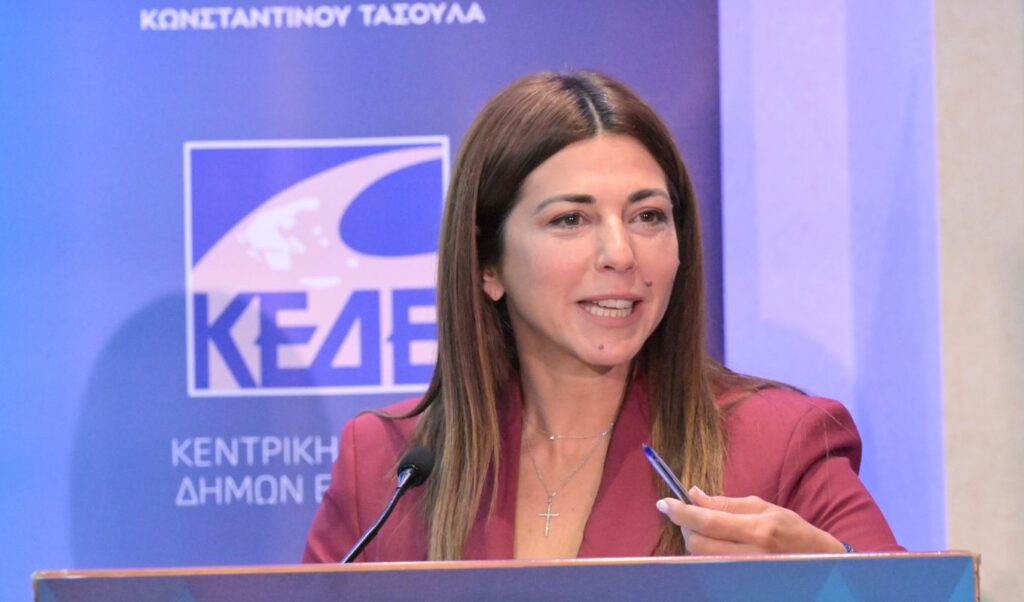The hiring of approximately 8,000 substitute teachers today or tomorrow at the latest, along with the creation of an electronic platform for recording and predicting vacancies by March 2026, was announced by Sofia Zacharaki, presenting the initiatives of the Ministry of Education, Religious Affairs and Sports to cover educational vacancies. The minister, speaking on SKAI radio, emphasized that preparation for the new school year began in March 2025, aiming for timely planning of appointments and hirings. Specifically, Ms. Zacharaki noted: “This year, in August, 10,000 permanent teachers were appointed in two phases with 37,000 substitutes, and the 3rd phase follows where approximately 8,000 additional substitute teacher hirings will be made in schools. The challenge is to fill the gaps, but we want to leave a legacy of planning, transparency and quality in education”.
Read: Zacharaki: “285,000 eternal students to be removed from Universities” (Video)
Schools: The new vacancy recording and prediction platform
Meanwhile, the minister announced that the electronic platform for recording and predicting educational vacancies, EDU-Plan, is expected to become operational from March 2026. “The platform will take into account organizational structures, operational needs, demographic data, as well as the characteristics of small and large school units. The goal is to have a comprehensive picture for the first time, so we can plan timely and accurately,” she emphasized.
Referring to covering remote areas with teachers, Ms. Zacharaki emphasized that since 2019, when she was Deputy Minister of Education, double scoring had been institutionalized for those serving in remote schools, while actions to provide housing for teachers are being strengthened. “In cooperation with municipalities, private individuals and the Ministries of National Defense and Interior, we secure housing solutions by utilizing municipal and military residences, as well as through tax incentives for those renting homes to substitute teachers”, she mentioned.
Travel and housing allowance for substitute teachers
Additionally, she mentioned that a new travel and housing allowance is proceeding through the Social Climate Fund, up to 150 euros monthly for substitutes serving far from their place of residence. Referring to school infrastructure, Sofia Zacharaki noted that their upgrade is progressing at a rapid pace, with the installation of an additional 2,900 new interactive boards while 36,000 are already in schools, the renewal of school libraries through ESPA, as well as the hiring of 400 librarians for the first time in schools. “We want schools that inspire children to create, cultivate their imagination and combine digital learning with craftsmanship which is also called the intelligence of hands,” she mentioned.
Zacharaki: I believe in a “fan” of experiences for children
It is noted that in her interview, the Minister also announced the expansion of the “Marietta Giannakou” program, which is already changing the image of schools throughout Greece. “Already 431 schools have been renovated with aesthetic and functional upgrade interventions while the goal is for more than 2,000 schools to be fully upgraded by 2028. With 100 million euros annually from banks and 50 million euros from the Public Investment Program, the Government ensures stable funding for projects that touch every corner of the country” declared Sofia Zacharaki.
Subsequently, responding to criticisms about creating craft and creation corners in schools, she explained that it constitutes a substantial learning tool that promotes creativity and life skills as craftsmanship activates and enhances learning, develops skills, cultivates persistence and promotes well-being and mental resilience. At the same time, the Minister referred to the launch of the pilot teacher training program on utilizing ChatGPT for teaching benefit, in cooperation with OpenAI and sponsored by the Onassis Foundation. “There is no disjunctive in education. Last September, together with Prime Minister Kyriakos Mitsotakis, we announced the introduction of artificial intelligence programs in schools. Today, we are adding an additional option for children, creative engagement. This is the meaning of this intervention, which I believe is very correct. I believe in a ‘fan’ of experiences for children. I believe in a classroom that has both the interactive board and the 3D printer but also the corner with crafts and our cultural tradition. Our goal, among others, is to enhance creative imagination, persistence and observation in children” Sofia Zacharaki characteristically emphasized.
Meanwhile, in cooperation with the Prime Minister, Government Spokesperson Pavlos Marinakis and Universities, the Ministry, as Sofia Zacharaki emphasized, is implementing a pilot program in 33 schools aimed at enhancing reading love and written and oral expression skills. “Children will learn to read newspapers, search for sources and compose articles. It is an initiative that cultivates thought, concentration and creativity,” the minister declared.
What Zacharaki said about removing “eternal” students
At the same time, when asked about removing “eternal” students from public Universities, Sofia Zacharaki emphasized that “the regulation for removing students who have exceeded the prescribed study time is now definitively implemented, with simultaneous provision of a second chance to those close to completing their program. We gave the opportunity to those who have accumulated at least 70% of credit units and have been active in the last two years to continue their studies”, the Minister declared, adding that “30,000 – 35,000 students expressed interest in completing their degree”. As she mentioned, people with disabilities and special categories of students, such as mothers with minor children or working students and athletes with objective attendance difficulties, are fully exempted from the process. “Someone cannot be enrolled for 20 years and not participate in University life. We want institutions that are alive, fair and functional,” she noted.
Additionally, the minister spoke about non-state, non-profit universities, emphasizing that the certification process of the first non-state, non-profit universities is developing with transparency and meritocracy, under the supervision of the National Authority for Higher Education (EΘAAE). “12 applications were submitted and 4 institutions were approved. At this moment the certification of their programs is being completed and within the next few days the final approvals will be announced, including the three Law Schools,” she mentioned.
The minister also clarified that the Minimum Entry Base (EBE) is maintained for all candidates, ensuring study quality. “These schools will operate with high academic criteria and will constitute a lever for the return of Greek scientists from abroad,” she emphasized.
In her interview, Sofia Zacharaki characteristically emphasized that our country has all the prerequisites to develop into a regional education center, with a combination of public and non-state institutions, foreign language programs, and collaborations with foreign universities. “The University is not simply a space of knowledge, but a living organism that must function with consistency, security and vision. We want to give our children choices, inspire them to complete their studies and stay in our country,” she concluded.




